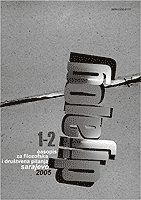POJAM STVARNOSTI U HEGELOVOJ FILOZOFIJI
THE CONCEPT OF REALITY IN HEGEL’S PHILOSOPHY
Author(s): Vojin SimeunovićSubject(s): Philosophy
Published by: Akademija Nauka i Umjetnosti Bosne i Hercegovine
Summary/Abstract: The concept of reality is a central concept of Hegel’s philosophy. An understanding of this concept makes it possible properly and legitimately to conceive of Hegel’s entire philosophy and its contemporary significance. What is real and what illusory or false – in other words, what is being and what is non-being – is indeed the fundamental question of every philosophy. Why, therefore, should one seek the meaning of the concept of the real and of reality primarily in Hegel’s philosophy, if it is a central concept of every philosophy? There are several reasons for this. One of the most fundamental is the fact that it was in Hegel’s philosophy that a radical transformation, a fundamental redefinition and essential reconstruction of this concept took place. Where does this transformation, this essential reconstruction lie? It lies primarily in the differentiation between the concept of the real and that of the existent, which is not to be found expressed in such clear and explicit terms in other philosophies. To put it simply, that which exists is not necessarily real. Only that which is essential is real, and only that which is rational is essential. “What is rational is real and what is real is rational.” That which exists is not necessarily real, because existence can be both accidental but not essential and not rational (as a rule), but non rational and non spiritual, not permeated with spiritual substance, which is also that which solely defines the concept of reality. That which is real is also that which is true. And only that which is absolute is true.
Journal: Dijalog - Časopis za filozofiju i društvenu teoriju
- Issue Year: 2005
- Issue No: 01+02
- Page Range: 173-189
- Page Count: 17
- Language: Bosnian

